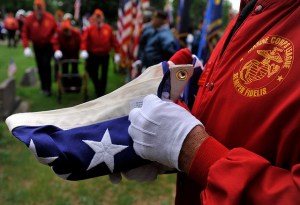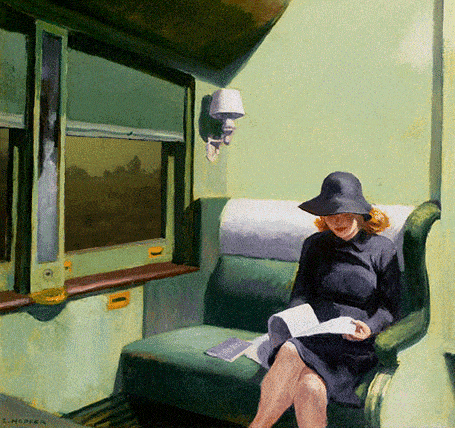The Rectitude of Silence
May 28, 2012 Leave a comment
The Memorial Day weekend and the recent retirement of my boss, a Vietnam veteran, tugged at some heart-strings drawing me back home…
At 6:00 am dad nudged me out of a dream where I had been standing over Grandma Johnson’s gravesite. Half awake I got out of bed and dressed being sure not to wake the rest of the family. When I reached the kitchen I could see from the window that dad was already in the car waiting for me. The car was running. I walked quietly back to my bedroom, grabbed my trumpet case and walked out the door.
In the car I sat silently as Dad drove us to the nearby Village Hall. There the Memorial Day ceremony would take place on the front lawn. Earlier in the year of ‘69 my father had become the village’s mayor. He was now to deliver the Annual Memorial Day Speech during this service of remembrance.
As we drove up a podium with a microphone was placed on the lawn outside the entrance to the village hall. All around us dozens of people were streaming out of their cars and joining the semi-circle facing the podium. Behind the podium there stood several men from the local VFW.
These veterans were decked out in their dress uniforms. Several of the uniforms bore chevrons and gold braids with medals festooning their chests. Thin ribbon bars, their colors revealing the military campaigns, the theaters of battle, they had been involved with. Bronze and silver stars and medals of commendation glinted in the morning sun light. An aged vet who had served in WWI sat in a wheel chair. There were many there who had served in WWII. And there were some, home from their first tour in Viet Nam, who looked like teenagers compared to the older vets.
I watched as front and center on the grass a detail of vets, each representative of a different branch of the armed services, practiced presenting the colors, recalling a formation they had learned years ago.
To one side of the podium my father talked about the order of the service with the speakers and presenters. A pastor would pray for the men and women in the military. A Marine captain would present the colors. A Navy ensign would recall Guadalcanal. An army vet would speak about things he held dear such as duty, honor, sacrifice and friendship. He would choke up as he spoke about comrades lost in battle.
At fifteen years old it was not lost on me that guys at the age of seventeen were going off to war and some were not coming back. The specter of going to war loomed ever larger for me, especially as horrific scenes of the Viet Nam war were shown on almost every nightly newscast. There seemed to be no end to the conflict in sight.
I knew guys just two years older than me who were being drafted. I knew that I could possibly be drafted and sent to off to Vietnam. I knew that would have to register with the selective service when I turned seventeen. The possibility sent chills down my spine. I picked up my horn out of its case and began nervously pumping the valves. Buzzing my lips against the mouthpiece I blew warm air through my trumpet. I wondered if I was good enough horn player to play with the U.S. Army Band.
At 7 am my dad moved to the podium and spoke a welcome to all who had “come out on this beautiful Memorial Day morning.” He acknowledged the members of the VFW and each Village trustee who had attended. To open the service he asked a pastor to come forward and lead the service with a prayer.
Before my father gave the pastor the microphone he asked that there would be a moment of silence in memory of those who had fallen. We bowed our heads.
Before me stood a WWII vet, head uncovered, head bowed. Overhearing him earlier talking to another vet I understood that he knew full well the horrors of war better than any acid-eyed tie-dyed peace protestor. This veteran had paid a significant price for any protestor’s right and the rights of Europeans and Asians to live free from tyranny’s aggression.
American men and women were able to assemble and protest because of the sacrifices men like this soldier made on their behalf. The strength of our republic lay in our individual resistance to evil where ever it threatens us – at home or abroad. And, here at home, an evil grew which was just as insidious as foreign aggression– licentiousness.
Carl Sr., a Presbyterian minister and the father of one of my close friends, prayed a blessing on the cherished memory of the fallen and their families. He prayed for those in the midst of battle that very day in Southeast Asia. He sought comfort and succor for those who live on with injuries received in battle, both physical and mental. He prayed for all those friends and families who had grieved the loss of loved ones. He then prayed for our nation, a nation openly riddled with discord and godlessness, submitting our country “to the Supreme Judge of the world for the rectitude of our intentions.”
After the prayer my father spoke. Dad’s words honored those who had gone to battle to protect our liberties and the liberties of our allies. He spoke of their commitment to freedom, to a higher purpose. He spoke of their courage not often found among men and women of this age. He spoke of their ultimate sacrifice: “greater love has no man than this that he lay down his life for his friend.” In closing, he hallowed their memory, echoing Abraham Lincoln’s words, saying, “…that these dead shall not have died in vain.”
The flag ceremony began. White gloved hands unfolded the American flag. Two vets held the corners of the flag, keeping it from ever touching the ground. Unfolded the flag was hoisted to the top of the nearby flag pole. My father, placing his hand over his heart, began: “I pledge allegiance to the flag…” I could see that the Stars and Stripes, at ease on this serene morning, moved the veteran’s hearts to their throats, pushing tears into their eyes. There were no placards of “Make Love Not War” here this morning. The bearers of those signs must have been sleeping in, secure in their beds.
After the pledge of allegiance a high school senior came to the microphone and led the singing of our national anthem. There were more tears and more memories halting reverent shaky voices.
I sang the anthem thinking about the year before: while young men and women were fighting in the steamy death-laden jungles of Southeast Asia east coast hippies gathered at the Fillmore East in New York City to hear Grace Slick sing about a White Rabbit.
Even at fifteen I knew that the peace-loving hippies had ceased fighting against the tyranny of drugs and the unbridled desires that come with it. They thought that all they needed was “Love.” And while “Peace” and “Love” became the mantras of their drug-infused songs, some of the protesters became aggressive and violent in their anti-war protests.
Bill Ayers the co-founder of the Weather Underground, a communist revolutionary group, began bombing public buildings as a sign of contempt over theU.S.involvement in the Viet Nam War. The contradiction, violent murderous aggression to obtain peaceful ends, didn’t make sense to me and it surely didn’t respect the freedom they clearly enjoyed, freedom paid for with the lives of decent peace-loving men and women.
“Now we will have the presenting of colors”, the loud-speaker sputtered dad’s words.
The honor guard, waiting in the background, marched to the front of the assembly. The commander led them through the drill. Once the men were in formation the American flag was presented and the other flags were lowered. The vets came to attention and saluted the flag.
Commands were given to the small rifle squad. Rifle barrels were inspected and loaded. The vets were then commanded to raise their rifles. “Ha-Ready,” “H-Aim,” “Fire!” The crack of twenty-one bombastic gun shots sent shock waves to my ear drums. The air began to fill with the smell of sulfur, chalk and burnt paper – gun powder. Smoke, in small billows rose above the rifles, seeming to carry the memory of fallen soldiers up into heaven.
After the twenty-first shot there was a long silent pause, lasting five minutes. Then my father nodded over at me. I stood outside the assembly with two other trumpeters, the three of us standing at fifty yard intervals within a cluster of cottonwood trees. Taking a long deep breath I began to play Taps. The second horn echoed a response after the first phrase and then the third trumpet echoed the second horn. From the corner of my eyes I could see the vets with their hands on hearts, their caps off and their heads bowed in solemn reverence: the fallen are remembered. Honor. Chivalry. Courage. Sacrifice. The fallen are remembered. Not forsaken. Never forsaken.
Day is done, gone the sun
From the lakes, from the hills, from the sky
All is well, safely rest
God is near.
Fading light dims the sight
And a star gems the sky, gleaming bright
From afar, drawing near
Falls the night.
Thanks and praise for our days
Neath the sun, neath the stars, neath the sky
As we go, this we know
God is near.
A gust of wind lifted the branches above me as the third trumpet’s final echo fell silent in the distance. The leaves shuddered and then the wind seemed to hold its breath, as if muted by grace. In that ethereal silence with ears already deafened by the sound of a twenty-one gun salute I was reminded of love’s supreme sacrifice, of a mother’s prayers rising up, of songs tearfully sung at gravesites and of sacred words commemorating lives offered in the line of duty. Though war will always be near because of mankind’s ungodliness God is always nearer.
That Memorial day I mournfully sounded the last trumpet call “Day is done” as a prayer of eternal rest for those men and women in the United States military who made the ultimate sacrifice. And since that day, as I’ve grown more silent, my soul again hears that last trumpet call. It is calling me to live a life worthy of the lives laid down for me, a life near to God.
© Sally Paradise, 2012, All Rights Reserved

